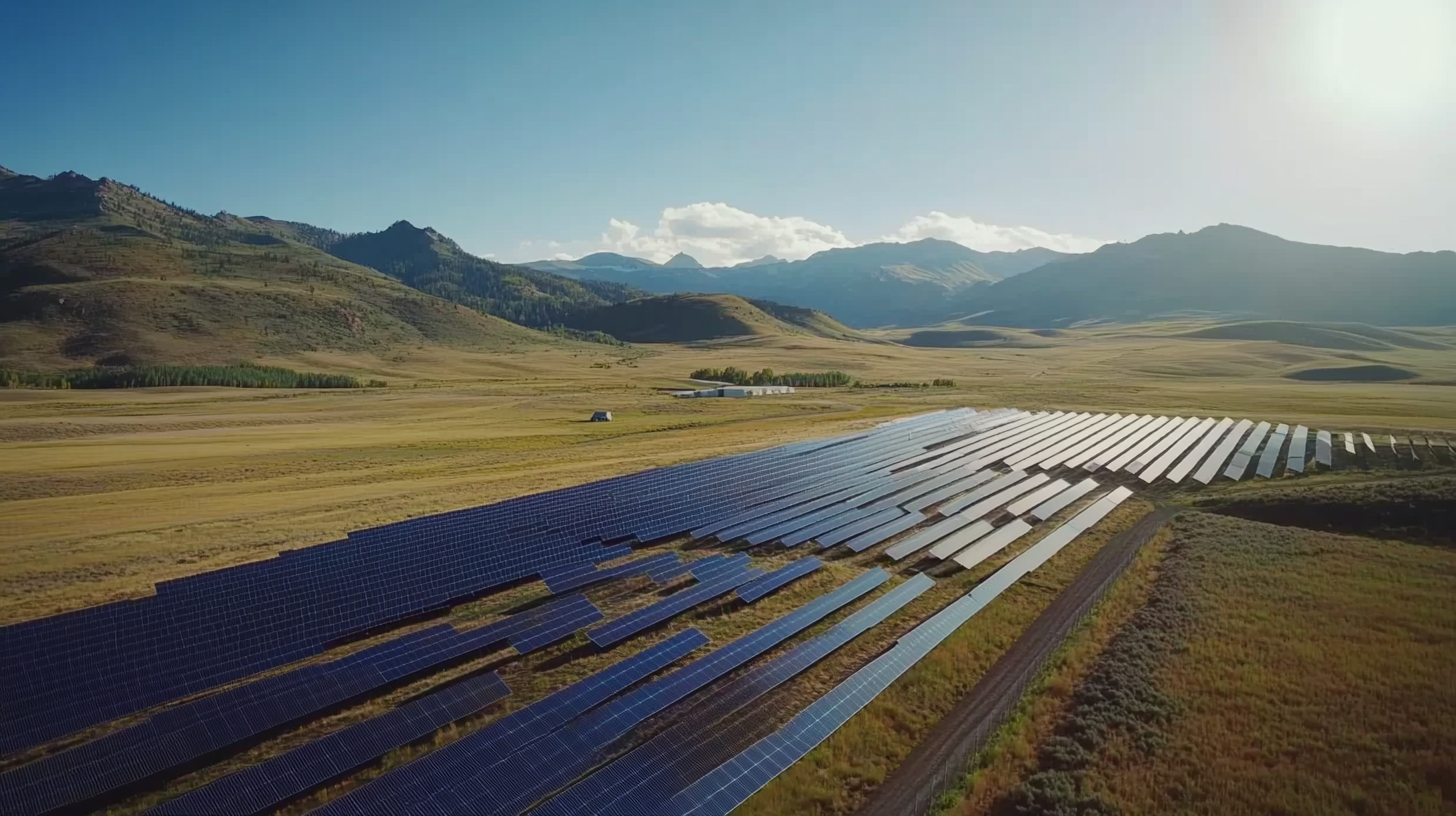Blog
- Home
- Blog
7 Ultimate Benefits of Choosing Power Solar Energy for Your Global Supply Needs
The world is rapidly shifting towards sustainable energy solutions in response to increasing environmental concerns and the search for reliable resources. Among the plethora of alternatives, Power Solar Energy stands out as a groundbreaking option that not only addresses the pressing issues of climate change but also ensures a dependable power supply for global needs. By harnessing the incredible potential of the sun, businesses and industries can significantly reduce their carbon footprint while enjoying long-term economic benefits.
In this blog, we will explore the seven ultimate benefits of choosing Power Solar Energy for your global supply needs. From enhanced energy efficiency and cost savings to improved brand reputation and sustainability, solar energy presents an array of advantages that cannot be overlooked. As we delve into these benefits, it becomes evident that adopting Power Solar Energy is not just a trend, but a strategic decision essential for future-proofing businesses and contributing to a greener planet.

The Environmental Impact of Solar Energy on Global Supply Chains
The shift towards solar energy has far-reaching implications, particularly in the realm of global supply chains. As businesses increasingly prioritize sustainability, solar power stands out as a clean and renewable resource that significantly reduces carbon footprints. By integrating solar energy into their supply processes, companies can minimize greenhouse gas emissions, contributing to a healthier planet. This transition underscores a commitment to environmentally conscious practices that resonate with modern consumers who increasingly factor sustainability into their purchasing decisions. Additionally, the adoption of solar energy offers economic advantages that enhance supply chain resilience. Solar installations can reduce reliance on fossil fuels, which are subject to volatile price fluctuations. By investing in solar energy, businesses can stabilize their energy costs, leading to more predictable budgeting and reduced operational risks. Furthermore, decentralized solar power generation can streamline supply chains by bringing energy production closer to the point of use, thereby decreasing transportation costs and enhancing efficiency. Ultimately, the environmental impact of solar energy reverberates throughout global supply chains, fostering innovation and encouraging collaboration among stakeholders. As companies work together to implement solar solutions, they not only bolster their own sustainability goals but also contribute to a collective effort to combat climate change. This cooperative approach positions organizations at the forefront of sustainable practices, creating a profound and lasting impact on the environment.

Cost Efficiency: How Solar Energy Lowers Operational Expenses Globally
As businesses increasingly seek sustainable solutions, the transition to solar energy has become a pivotal strategy for reducing operational expenses. A report by the International Renewable Energy Agency (IRENA) indicates that the global cost of solar photovoltaic (PV) systems has dropped by nearly 89% since 2009. This significant decrease in capital costs has made solar energy not only an environmentally friendly alternative but also a financially viable option for companies looking to optimize their operational budgets.
Moreover, adopting solar energy can lead to substantial long-term savings. According to a study by Lazard, the levelized cost of electricity (LCOE) from solar power has become more competitive compared to traditional fossil fuels. In many cases, organizations can save between 20% to 40% on energy costs by switching to solar. Additionally, the decentralized nature of solar energy allows companies to generate their own power on-site, which mitigates exposure to fluctuating energy prices and reduces dependence on utility providers.
Furthermore, embracing solar energy enhances resilience against supply chain disruptions, a critical factor for global operations. The COVID-19 pandemic highlighted vulnerabilities in energy supply chains, prompting many organizations to reassess their energy strategies. By investing in solar energy, businesses can secure more predictable energy costs and ensure continuity in operations, ultimately leading to greater stability and profitability in an uncertain global market.

Reliability and Consistency of Solar Power in Supply Operations
The reliability and consistency of solar power have become increasingly significant factors for businesses looking to streamline their supply operations. According to a report by the International Energy Agency (IEA), solar energy has seen an unprecedented growth rate, making it one of the most reliable renewable energy sources. In 2020, global solar power capacity reached over 770 GW, with a projected increase of approximately 12% annually in the coming years. This reliable expansion not only enhances energy security but also stabilizes costs in a volatile energy market.
Furthermore, solar energy provides a consistent supply that can significantly reduce dependency on fossil fuels. Research from the National Renewable Energy Laboratory (NREL) emphasizes that solar power generation can be reliably forecasted, allowing companies to plan and manage their energy consumption more effectively. The ability to predict solar energy output helps businesses avoid unexpected spikes in costs associated with conventional energy sources. In fact, integration of solar power can lead to a 25-50% reduction in energy expenditures in supply operations.
Additionally, advancements in energy storage technologies complement the reliability of solar power. The deployment of battery storage systems enables companies to store excess solar energy generated during peak sunlight hours for use during high-demand periods. Data from Wood Mackenzie indicates that the energy storage market will grow significantly, with installations expected to exceed 300 GWh by 2025. This ensures businesses can maintain operational efficiency and reliability of supply even during periods of low sunlight or high demand, reinforcing the advantages of choosing solar energy for global supply chains.

Innovative Technology and Its Role in Enhancing Solar Energy Usage
Innovative technology has revolutionized the way we harness solar energy, making it an increasingly viable option for global supply needs. One of the most significant advances is in photovoltaic (PV) cell efficiency. New materials and designs have led to solar panels that convert sunlight into electricity at unprecedented rates. This not only allows for greater energy production but also reduces the land area required for solar installations, making it feasible for urban environments and remote locations alike.
Another pivotal innovation is the integration of smart grid technology with solar energy systems. By utilizing advanced sensors and AI algorithms, energy distribution can be optimized in real time, ensuring that solar power is used efficiently and effectively. This technology facilitates better load balancing and energy storage solutions, enabling businesses and households to draw on solar energy at peak times, without relying solely on battery storage. The result is a more resilient and responsive energy system that enhances the reliability of solar power in meeting global supply demands.
In addition, the advent of energy management systems has empowered users to monitor and control their solar energy usage dynamically. These systems provide valuable insights into energy consumption patterns and offer recommendations for optimizing energy use. By leveraging data analytics, individuals and organizations can maximize their solar energy utilization, further driving down costs and supporting sustainability goals. The synergy between innovative technology and solar energy not only enhances efficiency but also positions solar power as a key player in the transition to a more sustainable energy future.
Sustainability Goals: Meeting Corporate Social Responsibility with Solar Energy Solutions
Corporate social responsibility (CSR) has become a pivotal element for businesses aiming to align their operations with sustainable practices. Embracing solar energy solutions is one of the most significant steps companies can take to demonstrate their commitment to sustainability. According to a report by the International Renewable Energy Agency, solar energy could supply as much as 25% of global electricity by 2050, emphasizing its potential to drive a cleaner energy future. By incorporating solar energy into their supply chains, organizations can significantly reduce their carbon footprints while promoting environmental stewardship.
The transition to solar not only supports CSR goals but also improves operational efficiency. A study from the Lawrence Berkeley National Laboratory highlights that companies using solar power report savings on electricity costs ranging from 20% to 50%. These financial benefits can be reinvested into further sustainability initiatives, enhancing the overall impact of CSR strategies. Furthermore, with the growing consumer demand for sustainable products, companies that adopt solar energy can improve their brand image and attract environmentally conscious customers.
Utilizing solar energy also helps organizations meet various regulatory requirements related to environmental performance. As governments worldwide implement stricter emissions regulations, businesses that proactively adopt sustainable energy sources can mitigate risks associated with non-compliance. This proactive approach illustrates a company’s dedication to responsible practices, potentially leading to partnerships and opportunities that prioritize sustainability. As the trend towards renewable energy accelerates, embracing solar solutions is not just a viable option; it is rapidly becoming a necessary strategy for organizations committed to meeting their sustainability goals.
